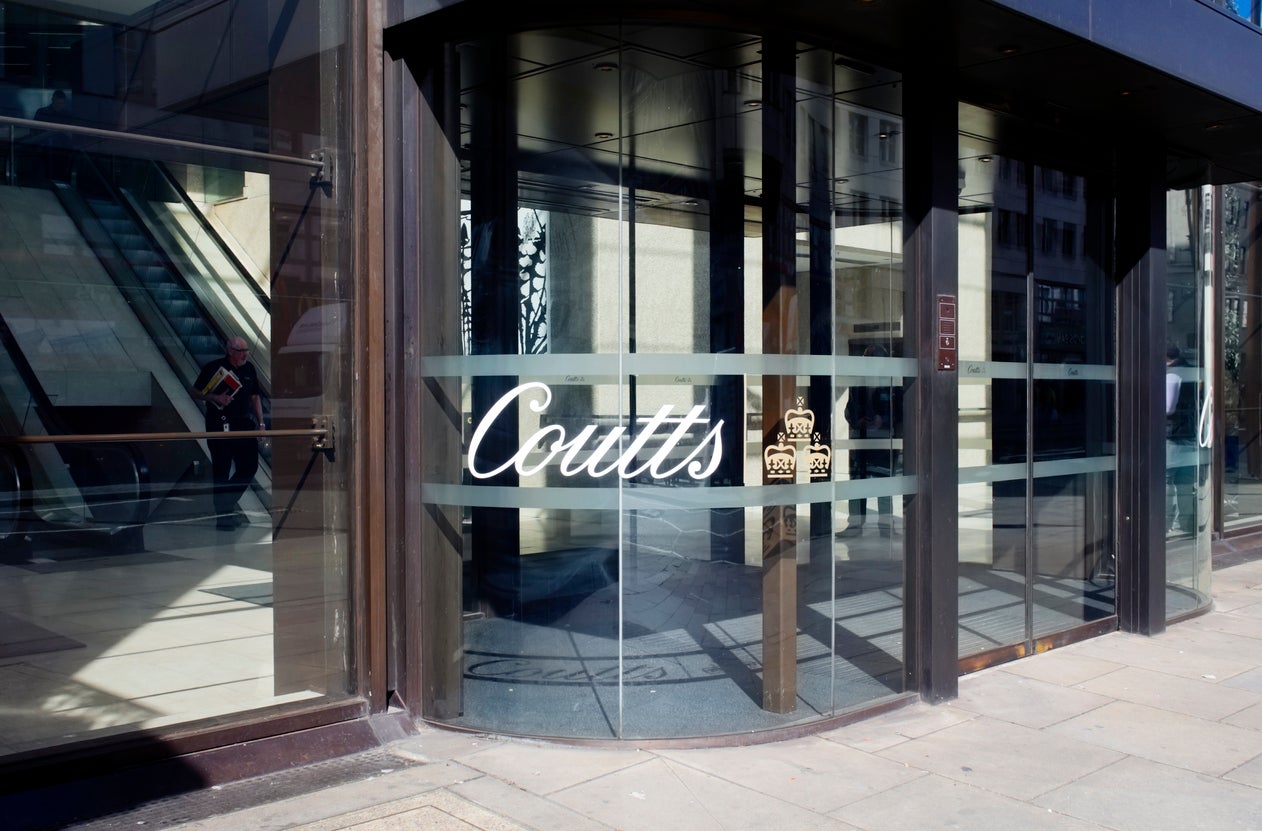Nigel Farage considering suing Coutts bank owner NatWest as account closure row rumbles on
Former Ukip leader says he is ‘considering all options’
Nigel Farage has said he is considering suing Coutts' owner NatWest after his bank account was closed, sparking a major row over free speech and interventions from the top of government.
The arch-Brexiteer and former Ukip leader claimed the bank had defamed him with comments it made in official papers about why it no longer wanted him as a customer.
It is the latest twist in an extraordinary spat between Mr Farage and the private bank, which apologised to Mr Farage earlier this week.
Mr Farage is also demanding an apology from the BBC, which reported that Coutts had shut the account because there wasn’t enough money in it. The corporation amended its story but has not issued an apology.
The Brexit supremo said it would be “difficult” to sue the BBC but that he was considering “all options” against NatWest.
He said: “It is difficult to sue the BBC but I am considering all options of what I do next, including legal action against NatWest.
“What was said about me in the report was unfair and defamatory.”
Mr Farage, 59, suggested last month that his account had been shut in revenge for Brexit or because he was a “politically exposed person” (PEP).
Through a subject access request, Mr Farage obtained a dossier from the bank that reportedly cited Mr Farage’s retweet of a joke by comedian Ricky Gervais about trans women and his friendship with tennis player Novak Djokovic, who is opposed to Covid vaccinations, to flag concerns that he was “xenophobic and racist”.
The dossier, made public by Mr Farage earlier this week, also repeated previous press reports, stemming from an old school friend, that a teenage Farage sang “gas ’em all, gas ’em all”, about Jewish people, as well as claims reported in the press from a former teacher that he “once marched through a Sussex village singing Hitler Youth songs”.

Coutts subsequently apologised to Mr Farage, with Dame Alison Rose, chief executive of NatWest Group, writing to the politician insisting that comments made in the dossier by Coutts “do not reflect the view of the bank”.
But pressure is now mounting on bosses at Coutts for the “deeply inappropriate” comments made about Mr Farage. Speculation is rising that Coutts CEO Peter Flavel may have to take responsibility for the fiasco as the ultimate decision over Mr Farage’s account rested with him.
Insiders say that Dame Alison was kept in the dark about what was going on and that Mr Flavel did not do enough to keep her fully updated.
Mr Flavel, a Harvard Business School alumni, joined Coutts as CEO in 2016 from JP Morgan.
Banking expert Sir Philip Augar said on Friday that Dame Alison’s apology to Mr Farage may not be enough to save her job and draw a line under the controversy.
“It cannot end for NatWest and it may not end for Alison Rose in particular,” he told BBC Radio 4’s Today programme.

“You cannot have a utilities type industry deciding who is free to give political opinions and who isn’t. It strikes at the core of democracy. It is like a water or electricity company saying ‘we won’t supply you because we don’t like your political views’.”
Asked if she should resign Sir Philip said: “It depends how much she knew [about the decision to ban Farage] and when.”
On Thursday the Treasury announced it will tighten rules on when and how a person’s account can be closed, in an effort to protect “freedom of expression”.
Under new regulations, banks will have to spell out why they are terminating an account, and give customers a notice period of 90 days. The change aims to give account holders more time to challenge decisions with the financial ombudsman.
The apology comes after pressure from senior Conservative politicians over the decision. Rishi Sunak’s press secretary told reporters on Wednesday that it would be “incredibly concerning and wrong” if Mr Farage’s accounts had been closed because of his political opinions.
Join our commenting forum
Join thought-provoking conversations, follow other Independent readers and see their replies
Comments


Bookmark popover
Removed from bookmarks